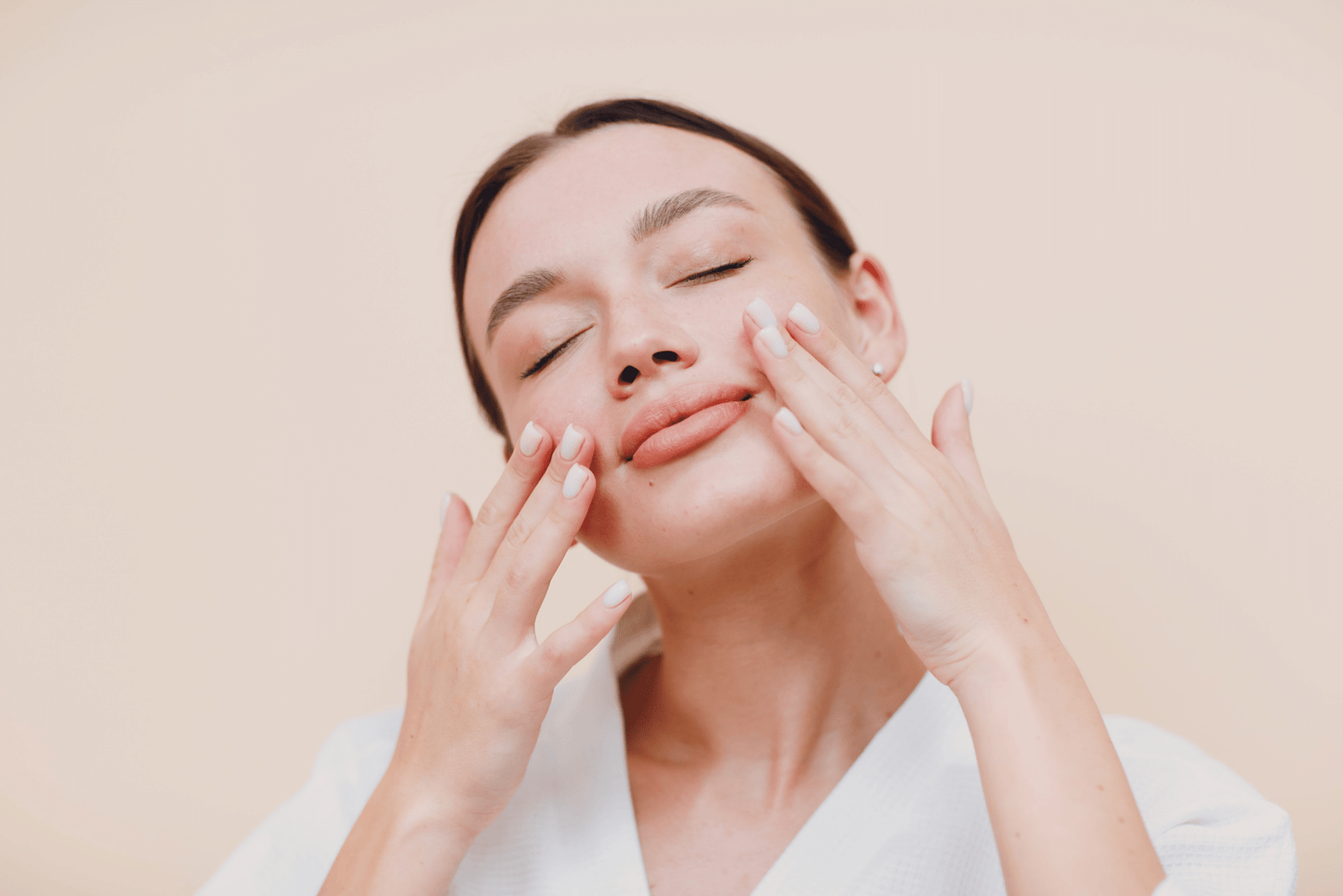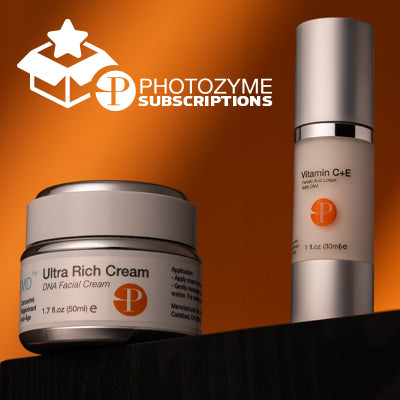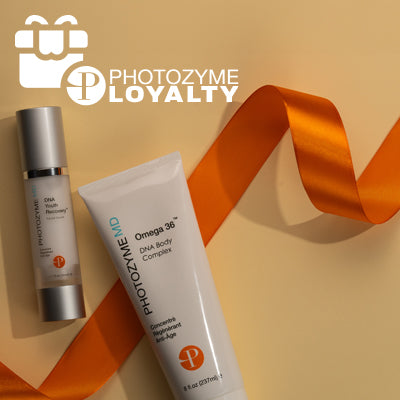
Key Takeaways:
- Why Stress Lines Form: Stress lines on the face emerge due to chronic stress, facial muscle tension, collagen and elastin breakdown, dehydration, and lack of sleep.
- The Impact Of Lifestyle Choices: Lifestyle choices such as diet, hydration, sleep quality, sun exposure, and stress management significantly influence the formation and visibility of stress lines.
- Tips For Preventing Stress Lines: Preventing stress lines requires a holistic approach involving balanced skincare, effective sun protection, stress management, a healthy diet, and proper hydration.
Stress is treatable.
While stress lines on the face are subtler, they reveal a glimpse into our inner state over a longer timeline. They often betray the pressures and tensions we carry with us. Understanding why stress lines emerge on our faces over time is a cosmetic concern and helps us move toward following practices to promote well-being.
At Photozyme LLC, we’re deeply invested in understanding the mysteries of skin health, particularly how external stressors contribute to aging. We offer products to mitigate the visual effects of stress and aging.
In this article, we’ll examine the causes of stress lines on the face, how lifestyle choices contribute to their formation, and effective strategies for prevention and treatment using innovative skincare solutions from Photozyme.
Causes Of Stress Lines On The Face
Stress lines on the face often manifest as deep furrows or fine wrinkles and primarily come from a combination of internal factors and external pressures. Understanding these causes can pave the way for more targeted skincare solutions.
1. Chronic Stress And Emotional Expressions
Prolonged stress affects mental health and physical appearance, especially the face. Chronic stress causes constant tensing of facial muscles, which develops stress lines. Furthermore, repetitive facial expressions, such as frowning or squinting, deepen these lines over time.
2. Collagen And Elastin Breakdown
Collagen and elastin are the skin's essential building blocks, providing structure and elasticity. Factors such as aging, environmental stressors (like UV radiation and pollution), and lifestyle choices (such as smoking and poor diet) accelerate the degradation of these vital proteins. This breakdown diminishes the skin's ability to bounce back, making stress lines more prominent.
3. Dehydration And Nutritional Deficiencies
Hydration plays a crucial role in maintaining skin elasticity. Dehydrated skin looks more wrinkled and aged, which can accentuate stress lines. Similarly, a lack of essential nutrients, including antioxidants, vitamins, and minerals, can impair the skin’s ability to regenerate and protect itself against stress-induced damage.
4. Sleep Deprivation
Quality sleep is crucial for skin health, as the body undergoes repair and regeneration during sleep. Lack of sleep can increase cortisol levels, further breaking down collagen and elastin and making the skin more susceptible to stress.
How Lifestyle Choices Contribute To Stress Lines
Understanding the impact of lifestyle choices on the appearance of stress lines on the face is crucial in maintaining a youthful and vibrant complexion. Various factors, often under our control, can significantly influence the development and visibility of these lines.
Diet And Hydration
The foods we consume play a significant role in skin health. Diets high in sugar and processed foods can lead to inflammation and oxidative stress, which accelerates skin aging and the formation of lines. Conversely, a diet rich in antioxidants, vitamins, and minerals can protect the skin from damage. Hydration is equally important; insufficient water intake can lead to dehydrated skin, making fine lines and wrinkles more noticeable.
Sleep Quality
Chronic sleep deprivation is a significant stressor to the body, leading to increased cortisol levels. High cortisol can break down the skin’s collagen and elastin, proteins that keep the skin firm and elastic. Ensuring adequate and quality sleep helps to mitigate this effect, supporting the skin's natural repair processes.
Sun Exposure
UV radiation from sun exposure is a leading cause of premature skin aging. The breakdown of collagen and UV rays' stress on skin cells contributes to facial lines and wrinkles. Adopting sun protection habits, such as broad-spectrum sunscreen and protective clothing, is essential to prevent these effects.
Stress Management
Chronic stress has a profound effect on the body, including the skin. It can trigger an inflammatory response and accelerate the breakdown of collagen and elastin. Finding effective stress management techniques, such as meditation, exercise, or hobbies, is vital for maintaining skin health.
Smoking And Alcohol Consumption
Both smoking and excessive alcohol consumption can exacerbate skin aging. Smoking reduces oxygen flow to the skin, while alcohol can dehydrate and damage the skin over time. Reducing or eliminating these habits can significantly improve skin appearance and reduce the formation of stress lines.
Stress Lines vs. Natural Aging: What's Different
When observing the aging process, it's crucial to distinguish between the stress lines that develop on your face and the changes caused by natural aging. Understanding this difference is key to adopting the most effective skincare routine.
Natural Aging
Natural aging is predominantly influenced by genetics and time. As we age, our skin naturally loses collagen and elastin, two proteins essential for maintaining firmness and elasticity. This loss results in the formation of fine lines, wrinkles, and sagging skin. Environmental factors such as sun exposure can accelerate this process, contributing to the visibility of these age-related changes.
Stress Lines
Stress lines on the face, on the other hand, are primarily the result of repeated facial expressions and the chronic effects of stress on the body. When we experience stress, our body releases cortisol, a hormone that can break down collagen and elastin, exacerbating the development of lines and wrinkles. Moreover, habitual facial movements, including frowning, squinting, or smiling, engrave lines into our skin, leading to what are known as expression lines. These stress lines often appear as forehead lines, crow's feet around the eyes, and lines around the mouth.
Stress lines are often deeper and more pronounced due to the repetitive muscle movements that carve them into the skin.
Addressing stress lines calls for topical treatments and significant lifestyle adjustments. Products like Photozyme's GFS Plus Night Serum help combat the effects of both stress and natural aging. This serum, infused with innovative and proprietary ingredients, helps reduce the appearance of fine lines and wrinkles by supporting the skin’s repair process and enhancing collagen production.
Prevention Strategies For Stress Lines
Preventing stress lines on the face begins with understanding the root causes and implementing daily practices to minimize their formation. Integrating the following strategies into your skincare and lifestyle routine may reduce the appearance of stress-induced lines on your face.
Adopt A Balanced Skincare Regimen
A balanced skincare routine is fundamental in preventing stress lines. Start by cleansing daily with a gentle cleanser, like Photozyme’s Probiotic P291 Cleanser, to remove impurities without stripping the skin of its natural oils. Follow up with a hydrating serum, such as the DNA Youth Recovery Facial Serum, to deeply nourish and repair skin at the cellular level, effectively reducing the appearance of fine lines and wrinkles. Incorporating a high-quality moisturizer, for instance, Photozyme’s Ultra Rich Cream, will further hydrate and protect the skin barrier against external stressors.
Prioritize Sun Protection
Exposure to UV rays can exacerbate stress lines by breaking down collagen and elastin, the proteins responsible for skin elasticity and firmness. Using a broad-spectrum sunscreen daily, such as BEYONDbloc, protects the skin from harmful UV rays and helps prevent the deepening of stress lines.
Manage Stress Effectively
Since emotional stress significantly contributes to developing stress lines, finding effective ways to manage stress is crucial. Techniques such as mindfulness meditation, regular exercise, and adequate sleep can significantly reduce stress levels, minimizing its impact on your skin.
Maintain A Healthy Diet
A diet rich in antioxidants, vitamins, and minerals supports skin health and can combat the signs of aging. Foods high in Vitamin C, Vitamin E, and omega-3 fatty acids, for instance, help promote collagen production and maintain the skin’s elasticity, reducing the formation of stress lines.
Stay Hydrated
Hydration is key to maintaining a plump, youthful complexion. Drinking plenty of water throughout the day ensures your skin remains hydrated from the inside out. This, in turn, can lessen the prominence of stress lines and improve overall skin texture.
Comparing Treatments For Stress-Induced Facial Lines
When tackling the challenging issue of stress lines on the face, it is crucial to explore and compare a range of treatments available today. Each approach offers unique benefits and considerations, from conventional skincare methods to cutting-edge technology.
Topical Creams And Serums
One of the most accessible and widely used treatments involves applying topical creams and serums designed to hydrate the skin and promote collagen production, potentially reducing the appearance of stress lines. Photozyme’s products use powerful ingredients to target the signs of age, including stress lines. Our proprietary formula is crafted to improve skin texture and diminish the visibility of wrinkles.
Professional Dermatological Treatments
Professional treatments offer several options for those seeking more pronounced results. Laser therapy, for instance, can improve skin texture and appearance by encouraging collagen and elastin production. Chemical peels, on the other hand, work by removing the outermost layers of skin, gradually reducing the appearance of lines. Qualified dermatologists should perform these procedures, and several sessions may be required to achieve the desired outcomes.
Lifestyle Modifications
In addition to external treatments, lifestyle modifications play a crucial role in managing stress lines. Adequate hydration, balanced nutrition, regular exercise, and sufficient sleep can all contribute to healthier, more resilient skin. Moreover, finding effective stress management techniques, such as meditation, yoga, or even counseling, can reduce the overall impact of stress on your body, including your skin.
Emerging Technologies
Skincare and cosmetology continually evolve, with new technologies promising better results with less invasive procedures. For instance, micro-needling and ultrasound therapy are gaining popularity for stimulating the skin's natural healing processes, leading to smoother and firmer skin over time.
Final Thoughts
Stress lines on your face reflect our internal and external pressures. Over time, the repeated muscle contractions triggered by stress and a decrease in skin elasticity and hydration contribute to these telltale signs of aging. Addressing stress lines requires a holistic approach that includes managing stress, adopting a healthy skincare routine, and using products specially formulated to combat the visible signs of aging.
Photozyme LLC, committed to innovation and quality, offers a range of products designed to target and reduce stress lines on the face. Featuring key ingredients with proven anti-aging benefits, our DNA Youth Recovery Facial Serum, alongside our comprehensive skincare lineup, provides a powerful solution for those looking to diminish the appearance of fine lines and wrinkles.
Read also:
- The Best Moisturizers For Aging Skin: Hydration And Anti-Aging Benefits
- How To Hydrate Your Skin: Best Methods For A Healthy Glow
- A Complete Guide To The Best Retinol For Beginners
Frequently Asked Questions About Stress Lines On Face
How does stress cause lines on the face?
Stress triggers cortisol, increasing oil production and making skin prone to acne. Chronic stress dehydrates the skin, highlights lines, and deepens them over time with repetitive facial expressions, like frowning.
Can stress lines become permanent?
Yes, untreated stress lines can deepen and become permanent. Stress management and skincare routines are key to reducing their appearance and preventing further damage.
Do stress lines appear in specific areas of the face?
Stress lines often form on the forehead, between the brows ("11" lines), and around the mouth and eyes, where stress-related facial expressions are most repetitive.
How can I tell if the lines on my face are due to stress?
Stress-related lines appear in areas of repetitive facial expressions and become more prominent during high-stress periods. Observing their timing and location can help identify their cause.
What lifestyle factors contribute to the development of stress lines?
Poor diet, lack of sleep, dehydration, smoking, alcohol, and inadequate skincare worsen stress lines by amplifying the effects of stress on skin health and elasticity.
Can genetics play a role in stress lines?
Yes, genetics influence stress line susceptibility. However, lifestyle choices and skincare practices also significantly affect their development and appearance.
Is there a difference between stress lines and wrinkles?
Stress lines result from stress-related expressions and can occur at any age. Wrinkles are linked to aging, collagen loss, and reduced skin elasticity. Both require proper care for management.
At what age do stress lines typically start to appear?
When collagen production slows, stress lines can appear as early as the late 20s or early 30s, and stress-induced facial expressions become more noticeable.




